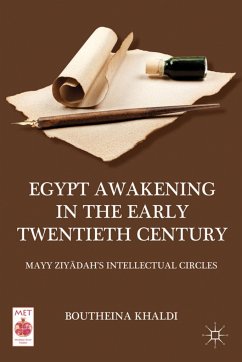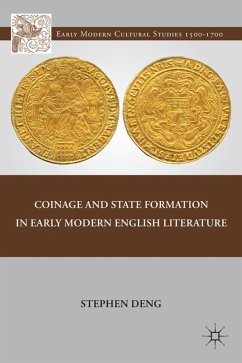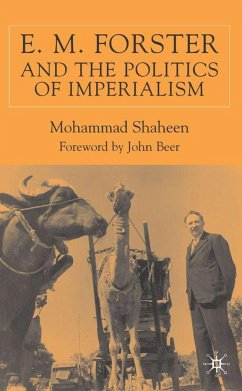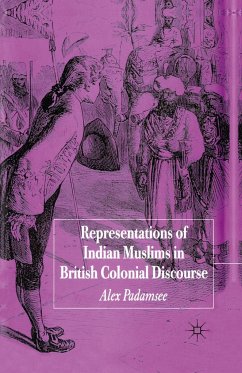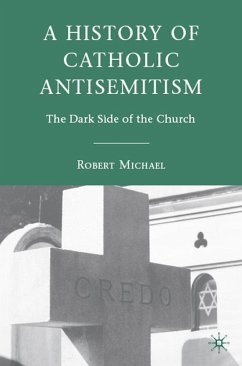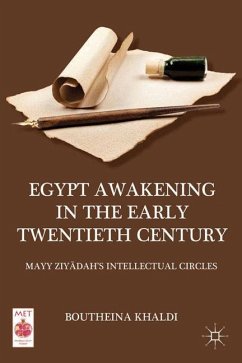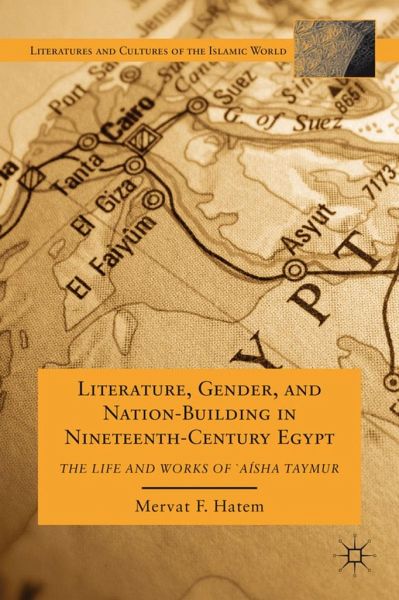
M. Hatem
Gebundenes Buch
Literature, Gender, and Nation-Building in Nineteenth-Century Egypt
The Life and Works of `A'isha Taymur
Versandkostenfrei!
Versandfertig in 6-10 Tagen

PAYBACK Punkte
38 °P sammeln!





This book examines how the process of nation-building in Egypt helped transform Egypt from an Ottoman province to an Arabic speaking national community. Through the discussion of the life and works of the prominent writer `A'isha Taymur, Hatem gives insight into how literature and the changing gender roles of women and men contributed to the definition and/or development of a sense of community.
Mervat F. Hatem is a Professor of Political Science atHoward University.
Produktdetails
- Literatures and Cultures of the Islamic World
- Verlag: Palgrave Macmillan / Palgrave Macmillan US / Springer Palgrave Macmillan
- Artikelnr. des Verlages: 978-0-230-11350-3
- 2011 edition
- Seitenzahl: 234
- Erscheinungstermin: 29. März 2011
- Englisch
- Abmessung: 211mm x 140mm x 18mm
- Gewicht: 395g
- ISBN-13: 9780230113503
- ISBN-10: 0230113508
- Artikelnr.: 32461910
Herstellerkennzeichnung
Libri GmbH
Europaallee 1
36244 Bad Hersfeld
gpsr@libri.de
"This is an important book. It is an analysis of the novels of one of the earliest Egyptian novelists, brings out the author's feminist concerns based on her religious knowledge, and shows a distinct Egyptian nationalism as opposed to a prior Ottoman one - long before it was fashionable to do either." - Afaf Lutfi al-Sayyid Marsot, Professor of History, UCLA
"This is an interesting book that examines the life and work of an interesting writer, `A'isha Taymur, who lived in an interesting time and place as Egypt transitioned from the Ottoman rule to British imperialism by forging a nationalist struggle. Taking a critical stance on the 'gendered' treatment of Taymur by her contemporaries and biographers, Hatem raises questions on the
"This is an interesting book that examines the life and work of an interesting writer, `A'isha Taymur, who lived in an interesting time and place as Egypt transitioned from the Ottoman rule to British imperialism by forging a nationalist struggle. Taking a critical stance on the 'gendered' treatment of Taymur by her contemporaries and biographers, Hatem raises questions on the
Mehr anzeigen
politics of discourse that are relevant to the study of many other postcolonial societies. Addressing a number of important issues - gender, nationalism, nation-building, modernization, religion, imperialism, class, identity - and illustrating their inter-connectedness in the life and work of one writer, Hatem offers a masterfully organized, well-written, informative, and engaging book. It makes a valuable contribution to postcolonial and feminist scholarship and speaks to the concerns of a number of disciplines." - Zehra F. Kabasakal Arat, Professor of Political Science, Purchase College, SUNY
"Hatem reveals for us the fascinating inner life of `A'isha Taymur, a woman whose unique talents and contributions to the early history of gender and nationalism in Egypt have been largely overlooked. Through a close study of Taymur's literary production, Hatem demonstrates how Taymur adapted older literary forms to the new ends of defining a nation, reconciling Islam and modernity in unexpected ways. Hatem's extensive translations and exposition of this body of work brings Taymur's voice to us in all its compelling complexity." - Judith E. Tucker, Professor of History, Georgetown University
"Hatem reveals for us the fascinating inner life of `A'isha Taymur, a woman whose unique talents and contributions to the early history of gender and nationalism in Egypt have been largely overlooked. Through a close study of Taymur's literary production, Hatem demonstrates how Taymur adapted older literary forms to the new ends of defining a nation, reconciling Islam and modernity in unexpected ways. Hatem's extensive translations and exposition of this body of work brings Taymur's voice to us in all its compelling complexity." - Judith E. Tucker, Professor of History, Georgetown University
Schließen
Für dieses Produkt wurde noch keine Bewertung abgegeben. Wir würden uns sehr freuen, wenn du die erste Bewertung schreibst!
Eine Bewertung schreiben
Eine Bewertung schreiben
Andere Kunden interessierten sich für



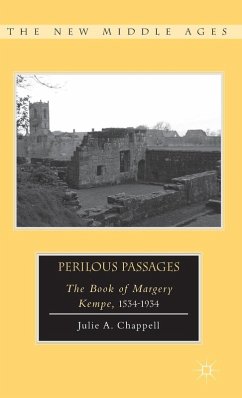
![The [European] Other in Medieval Arabic Literature and Culture Cover The [European] Other in Medieval Arabic Literature and Culture](https://bilder.buecher.de/produkte/45/45079/45079745n.jpg)
![The [European] Other in Medieval Arabic Literature and Culture Cover The [European] Other in Medieval Arabic Literature and Culture](https://bilder.buecher.de/produkte/33/33722/33722602n.jpg)
